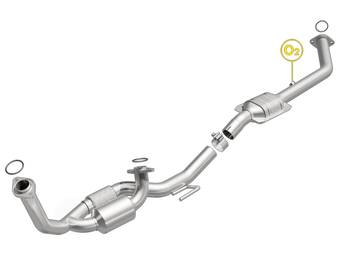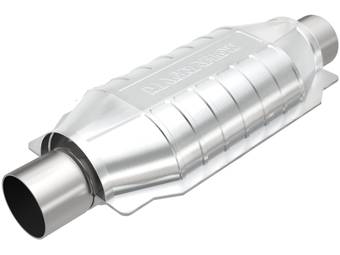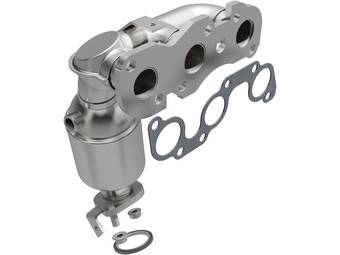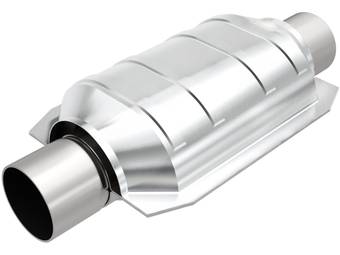Free Shipping on Orders Over $100
2000 Toyota Sienna Catalytic Converters
Catalytic Converters
Catalytic converters prevent harmful chemicals from exiting your truck’s tailpipe and polluting the atmosphere. These components are installed inline in your vehicle’s exhaust; depending on the year, make, and model, your vehicle may be equipped with one, two, or even three converters!
Catalytic converters are composed of a ceramic substrate embedded with precious metals. As hot exhaust gasses pass through the substrate, carbon monoxide, nitrogen oxides, and hydrocarbons immediately convert to less harmful compounds, like carbon dioxide, nitrogen, and water vapor.
Catalytic converters were first developed in the early 1950s; however, they didn’t reach mainstream implementation until the Clean Air Act of 1970, which mandated that auto manufacturers significantly reduce tailpipe emissions. Since then, most production vehicles have come fitted with catalytic converters and require them to pass bi-annual SMOG inspections to operate on the road.
Unfortunately, catalytic converters can deteriorate over time, losing effectiveness, clogging, triggering CELs, and degrading drivability. Luckily, RealTruck carries a wide variety of CARB and Federal-legal catalytic converters to ensure smooth, clean, and efficient operation!
Direct-Fit vs. Semi-Universal Catalytic Converters
Catalytic converters typically feature flanged ends that bolt into the factory exhaust system; as such, most companies produce direct-fit replacements, which feature identical flange positions to mount directly into the factory location on your vehicle’s exhaust. Alternatively, some manufacturers offer budget-friendly universal variants with traditional weld-on ends, requiring fabrication for a perfect fitment.
Symptoms of a Bad Catalytic Converter
There are several ways to tell if your vehicle’s catalytic converter is compromised; some of the most common include:
A strong sulfur/ rotten egg scent, especially under hard acceleration
Dark smoke from the tailpipe
Notable rattling from the catalytic converter area
Sluggish engine performance
Poor fuel economy
An illuminated check engine light
Why are Catalytic Converters a Popular Target for Thieves?
Aside from replacing a damaged catalytic converter, several motorists are required to purchase replacements due to theft! But why would anyone want to steal a piece of your vehicle’s exhaust system?
Catalytic converters contain precious metals embedded into the ceramic substrate, like rhodium, palladium, and platinum. A single converter can go for several hundred dollars at scrap yards and recycling plants! Until recently, no documentation was required, allowing thieves to steal numerous converters and cash them in for thousands! Thankfully, recent regulations have required persons to provide documentation for the sale, cutting down on theft.
For more information on Theft Proofing Your Catalytic Converter, check out our post on RealSource!





